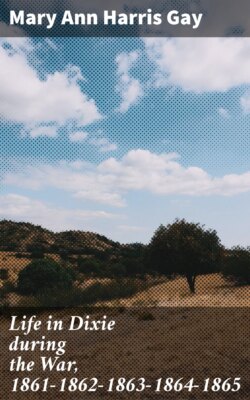Читать книгу Life in Dixie during the War, 1861-1862-1863-1864-1865 - Mary Ann Harris Gay - Страница 14
На сайте Литреса книга снята с продажи.
CHAPTER VIII.
ОглавлениеTable of Contents
SOME SOCIAL FEATURES.
Morgan’s Men Rendezvous near Decatur—Waddell’s Artillery—Visits from the Texans—Surgeon Haynie and his Song.
In the winter of 1864 there seems to have been a lull of hostilities between the armies at “the front.” Morgan’s men were rendezvousing near Decatur. Their brave and dashing chief had been captured, but had made his escape from the Ohio penitentiary, and was daily expected. Some artillery companies were camping near, among them Waddell’s. There was also a conscript camp within a mile or two; so it is not to be wondered at that the young ladies of Decatur availed themselves in a quiet way of the social enjoyment the times afforded, and that there were little gatherings at private houses at which “Morgan’s men” and the other soldiers were frequently represented.
Our brother was absent in Texas, where he had been assigned to duty, but my sister was at home, and many an hour’s entertainment her music gave that winter to the soldiers and to the young people of Decatur. My mother’s hospitality was proverbial, and much of our time these wintry months was spent in entertaining our soldier guests, and in ministering to the sick in the Atlanta hospitals, and in the camps and temporary hospitals about Decatur.
So near were we now to “the front” (about a hundred miles distant), that several of my brother’s Texas comrades obtained furloughs and came to see us. Among these were Lieutenants Prendergast and Jewell, Captain Leonard and Lieutenant Collins, Captain Bennett and Lieutenant Donathan. They usually had substantial boots made while here, by Smith, the Decatur boot and shoe maker, which cost less than those they could have bought in Atlanta. We received some very pleasant calls from Morgan’s men and Waddell’s Artillery. Among the latter we have always remembered a young man from Alabama, James Duncan Calhoun, of remarkable intellectual ability, refreshing candor and refinement of manner. Ever since the war Mr. Calhoun has devoted himself to journalism. Among the former we recall Lieutenant Adams, Messrs. Gill, Dupries, Clinkinbeard, Steele, Miller, Fortune, Rowland, Baker, and Dr. Lewis. These gentlemen were courteous and intelligent, and evidently came of excellent Kentucky and Tennessee families. One evening several of these gentlemen had taken tea with us, and after supper the number of our guests was augmented by the coming of Dr. Ruth, of Kentucky, and Dr. H. B. Haynie, surgeon of the 14th Tennessee Cavalry. Dr. Haynie was an elderly, gray-haired man, of fine presence, and with the courtly manners of the old school. On being unanimously requested, he sang us a song entitled: “The Wailings at Fort Delaware,” which he had composed when an inmate of that wretched prison. As one of the gentlemen remarked, “there is more truth than poetry in it;” yet there are in it some indications of poetic genius, and Dr. Haynie sang it with fine effect.
